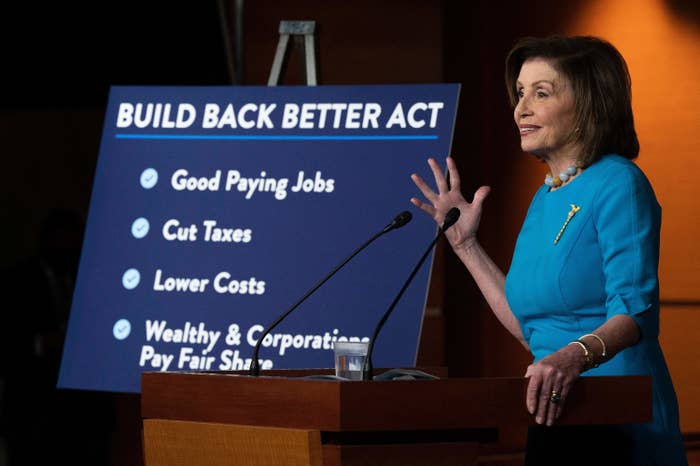
WASHINGTON — After months of negotiations, the House of Representatives has passed the Build Back Better Act, the Democrats’ far-ranging social program and climate change bill. But the bill could be significantly altered in the Senate, where it faces major hurdles.
The House passed the Build Back Better Act in a near party-line vote of 220–213. Every Republican voted against the bill, while every Democrat supported it except for Maine Rep. Jared Golden.
It’s a major leap forward for a package that includes practically every major social and environmental action Democrats plan to pass this year. It includes universal prekindergarten, four weeks of paid family leave, $3,600 per year child tax credits, and hundreds of billions of dollars toward combating climate change.
“The Build Back Better agenda creates jobs, secures tax cuts for the middle class, lowers costs for families while making the wealthiest pay their fair share,” said House Speaker Nancy Pelosi shortly before the vote.
The bill now goes to the Senate, where passage is far from a sure thing.
The House was supposed to hold just 20 minutes of debate on the bill Thursday evening, but Minority Leader Kevin McCarthy launched an eight-and-a-half hour speech railing against it. It is believed to be the longest speech in the history of the chamber, breaking Pelosi’s previous record of around eight hours. McCarthy finished after 5 a.m. Friday, pushing the vote to later that morning. Despite McCarthy’s history-making performance, the ultimate results were the same.
The House vote came after the Congressional Budget Office estimated the Democrats’ efforts to tax the rich will not be enough to fully pay for the bill’s almost $2 trillion of spending over the next decade.
The CBO found that the bill as currently written would add $160 billion to the national debt over 10 years. But that gap between costs and revenues was close enough that centrist Democrats agreed to vote to move the package forward.
All sides anticipate further changes will be made to the bill. Progressives expect Sens. Bernie Sanders, Jon Tester, Bob Menendez, and others to scale back federal deductions for state and local taxes, known as SALT. As currently written, the SALT provisions disproportionately benefit wealthy earners. The issue has split progressives, who are mortified that their bill may result in a tax cut for many millionaires, and certain Democrats from high-tax states like New York, New Jersey, and California who are trying to lower their constituents’ tax bills.
“It’s bullshit that we would even think about any kind of tax cut for the wealthy in this,” Ohio Rep. Tim Ryan said. "The whole program here is to put money in the pockets of working people."
Progressive priorities in the bill — paid family leave in particular — may also soon be on the chopping block in the Senate, due to resistance from Sens. Joe Manchin and Kyrsten Sinema. The party’s 50–50 majority in that chamber (Vice President Kamala Harris holds the tie-breaking vote) means any single senator can force changes to the bill by threatening not to support it.
Democrats have had to continually rewrite the bill as members fought for or against certain items. The original plan to raise income and capital gains taxes on the rich, as well as the corporate tax rate for large businesses, was blocked by Sinema. The party rebounded by drafting a tax surcharge on people making more than $10 million in income per year.
Some Democrats had pushed for a “billionaire’s tax” on capital gains growth because the ultrawealthy frequently grow their fortunes through stocks and assets while drawing little salary. That proposal never got off the ground.
Manchin has repeatedly expressed concerns that the size of the package may contribute to inflation. While he has offered vague support for the framework of the bill, he notably has not agreed to support a new paid family leave program.
Any changes the Senate makes would eventually need to be agreed to by the House. Getting everyone on the same page could take weeks.
The bill also expands Affordable Care Act subsidies to help more people to purchase health insurance. The CBO projects this measure would lead to 1.4 million more people being covered. It also expands Medicare to cover hearing and allows Medicare to directly negotiate the prices of some drugs. The CBO projects these negotiations will save the government $79 billion over the next decade.
Democrats are using a special congressional process known as budget reconciliation to pass the bill through the Senate without any Republican votes. Normally, bills are vulnerable to a filibuster unless 60 senators vote to override. Under reconciliation, a bill can be passed with a simple majority but faces other constraints in how it must be designed.
